

Unbounce Reviews & Product Details
Unbounce is a flexible and powerful landing page builder for all screen sizes. It offers two solution categories. While it offers code-free drag-and-drop functionality for solopreneurs and lean teams with limited development resources, it also allows for custom JavaScript and CSS programming for more experienced users. Unbounce offers two major product categories – Classic Unbounce and Conversion Intelligence Platform. Classic Unbounce allows marketers to design pages in minutes with its 300+ built-in templates and integration with theme stores, plus an array of marketing-focused capabilities such as offer targeting, A/B testing, and content gating just to name a few. The newer Conversion Intelligence Platform leverages AI and machine learning that empowers businesses to create high-converting marketing campaigns. It offers industry-specific, goal-based, and data-driven page templates, content delivery based on traffic sources and visitor attributes, and AI-assisted copywriting capability.


| Capabilities |
|
|---|---|
| Segment |
|
| Deployment | Cloud / SaaS / Web-Based |
| Support | 24/7 (Live rep), Chat, Email/Help Desk, FAQs/Forum, Knowledge Base, Phone Support |
| Training | Documentation |
| Languages | English |
Unbounce Pros and Cons
- Extensive guides and resources
- Excellent natural copy generation, with minimal editing required.
- Multiple template options for product descriptions, ad copy, landing pages, Facebook ads, and more
- Chrome extension to automatically create content on social channels.
- Excellent A/B testing functionality
- Not ideal for creating long-form copy, due to limited output options.
- No options to help you organize your content.
- It needs better analytics tracking
- Price is uninviting unless you’re making money
- Responsiveness and mobile optimization could be improved
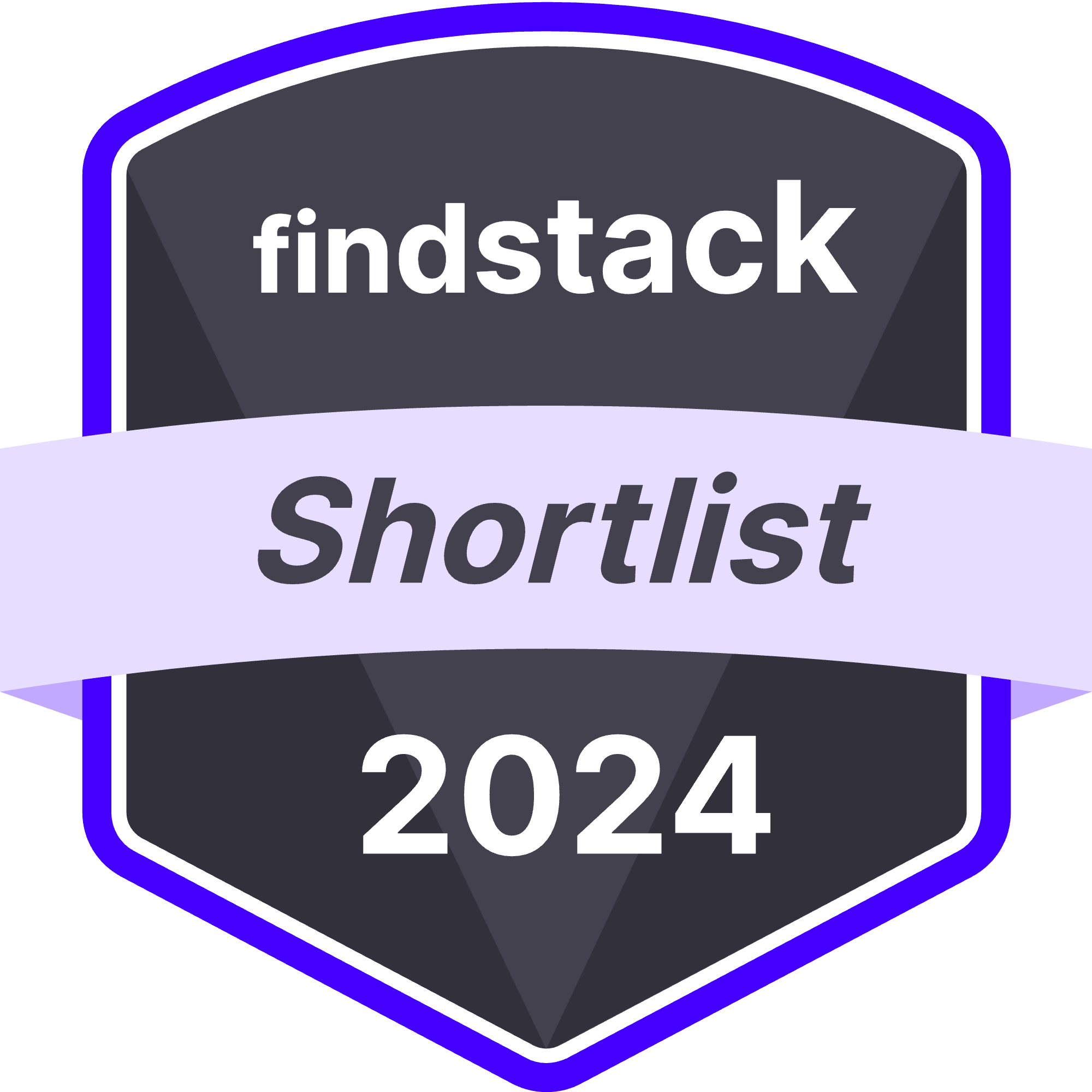
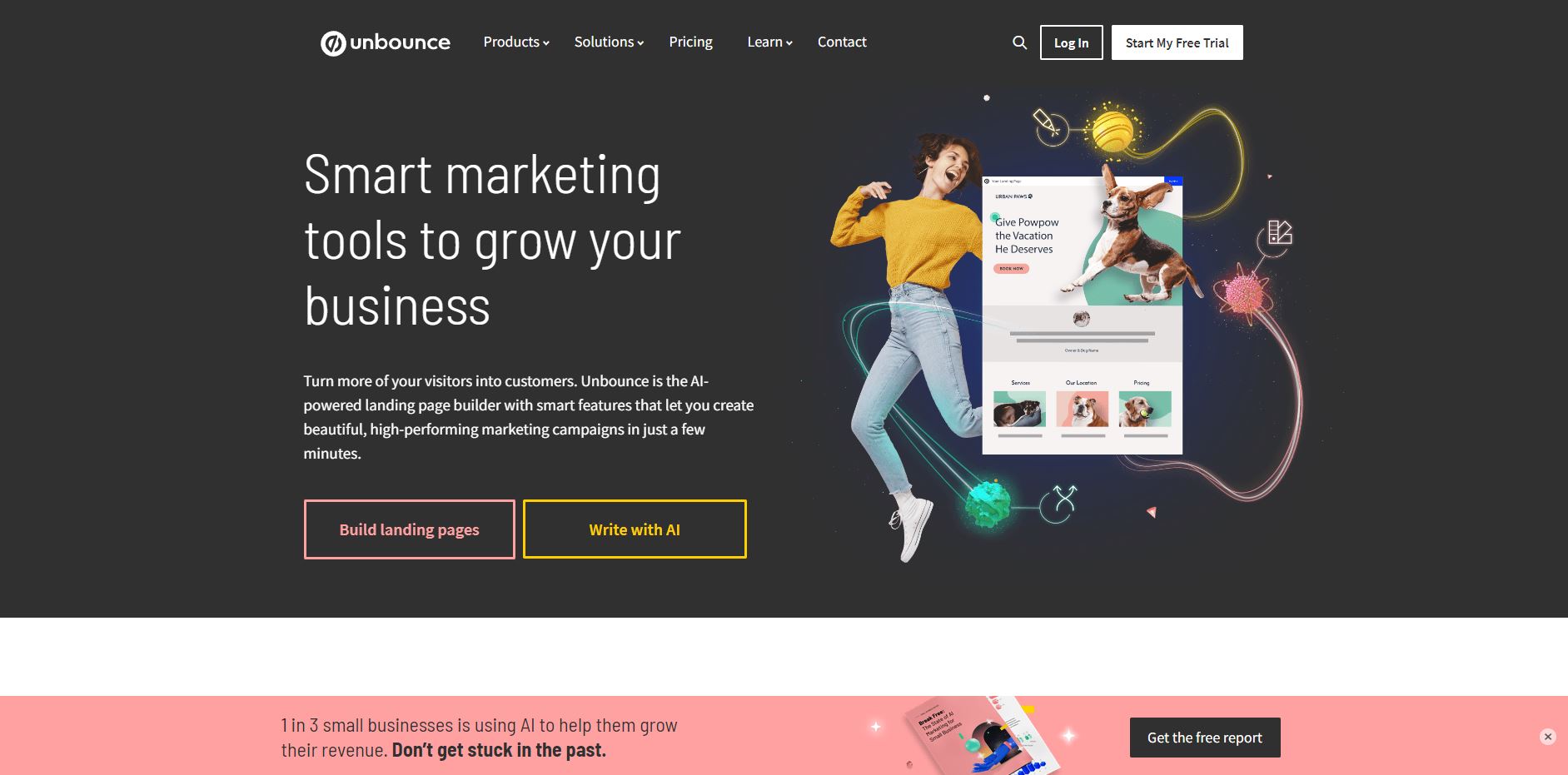
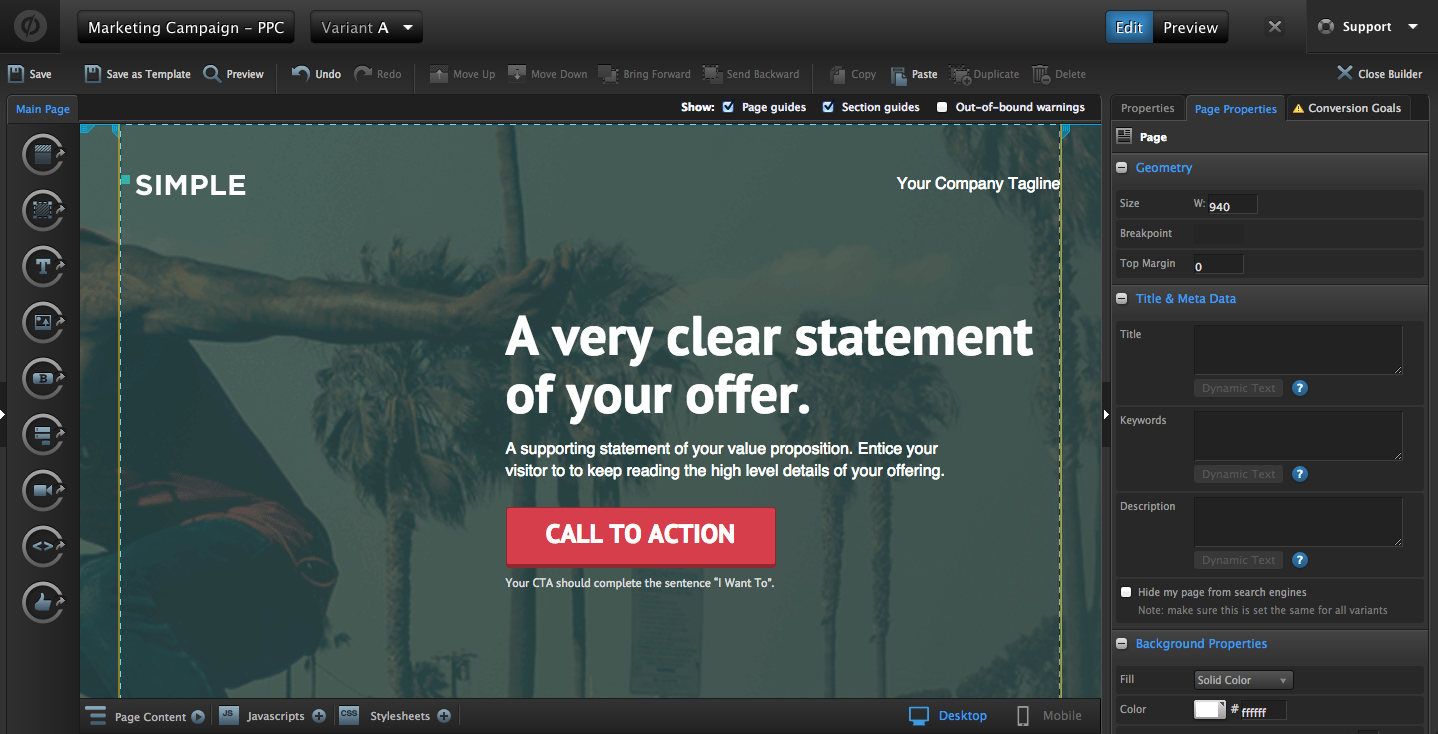
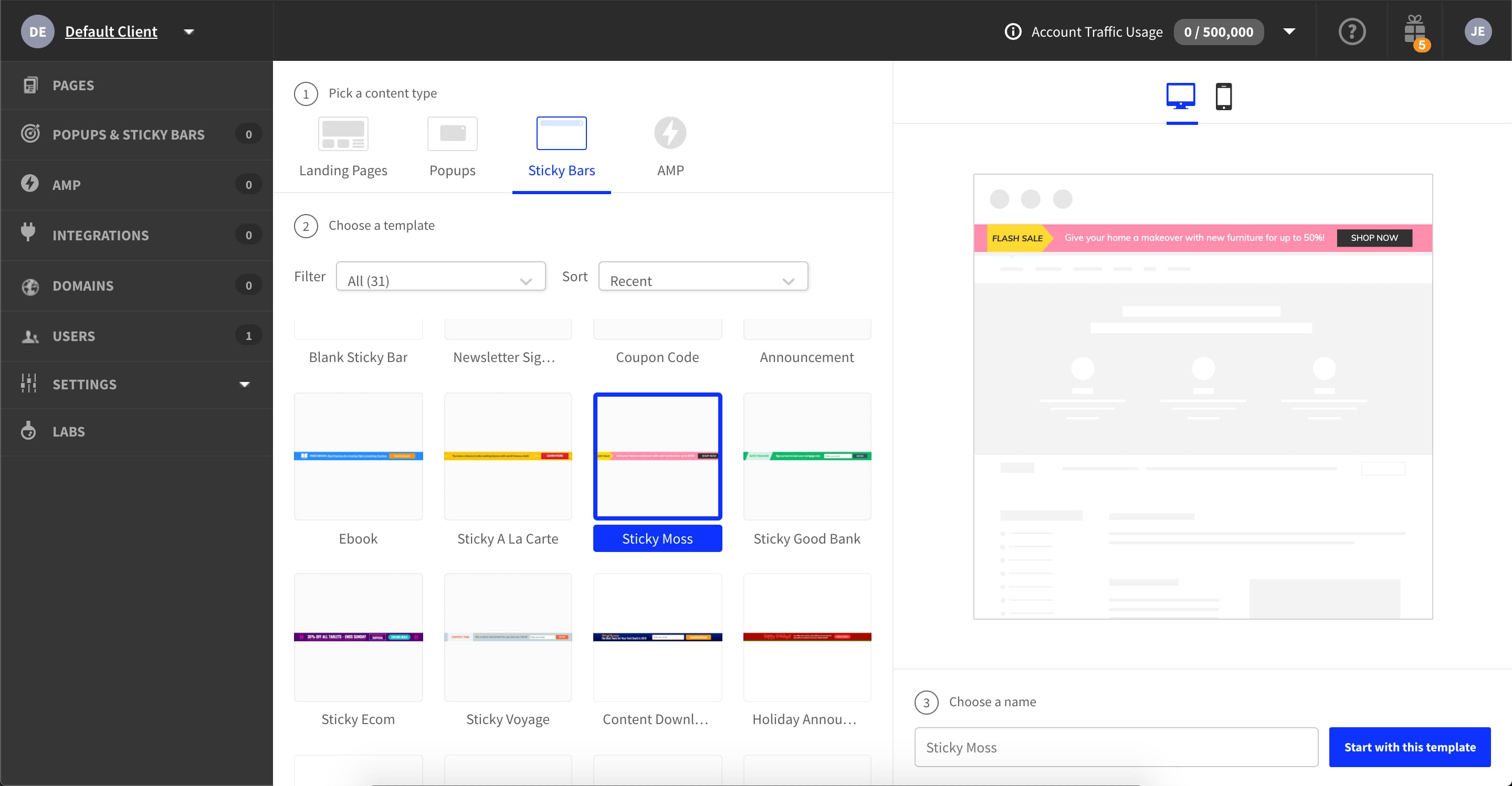
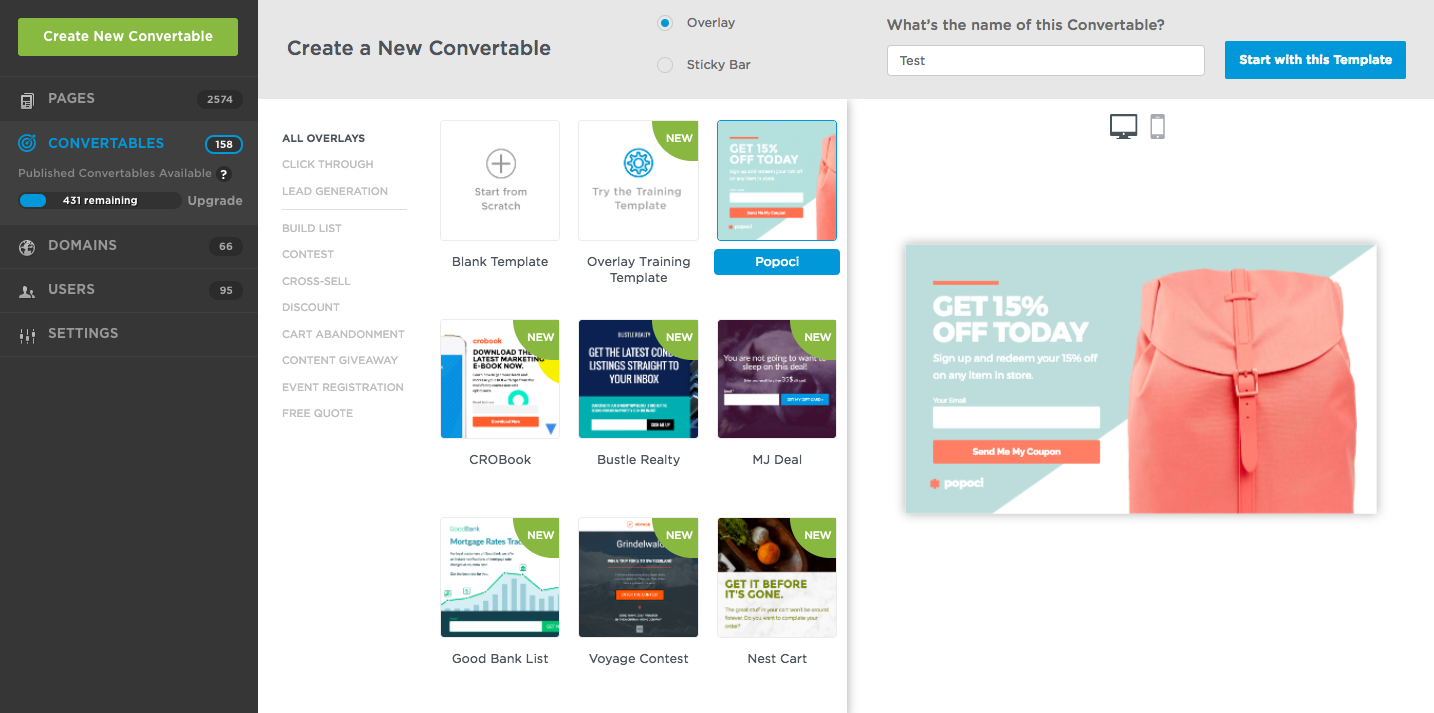
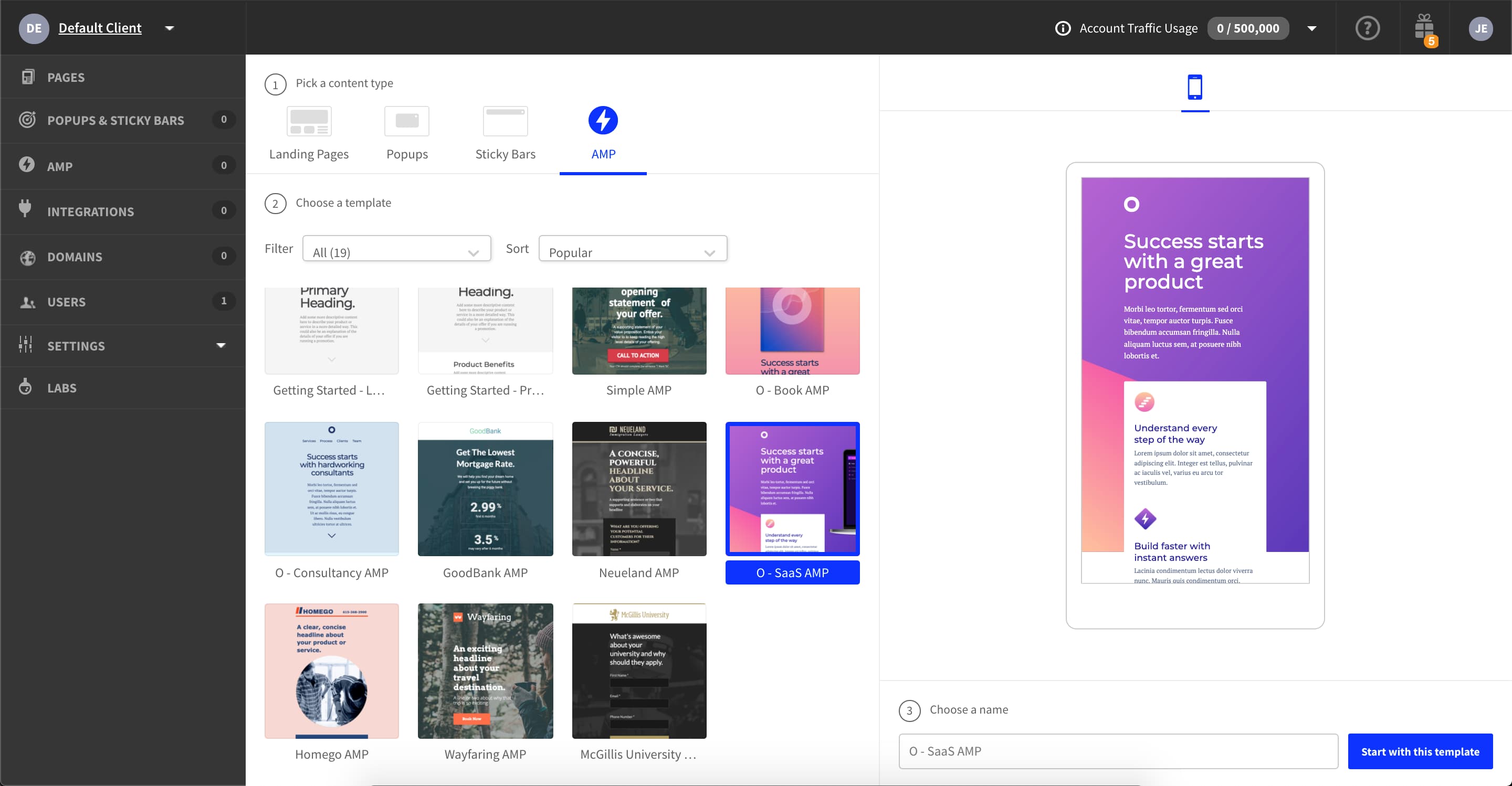
Unbounce is by far one of the most prolific and popular landing page builders on the market. Part of what makes it so appealing is its versatility. The solution gives companies multiple ways to capture leads, with pop-ups and sticky bars, lead forms, and various other fantastic tools.
Of course, Unbounce is far from the only landing page and lead capture tool on the market. There are countless other contenders out there, all promising their own amazing functionality.
To help you determine whether Unbounce is really the tool for you, we’re going to take a deep dive into its features, exploring its various pros, and a couple of cons.
What is Unbounce? : An Introduction

Unbounce is a landing page builder, but it’s also a lot more than that. First launched in 2009, it was one of the first tools to introduce business owners to a more effective way of capturing leads. Before Unbounce, creating landing pages meant you needed extensive developer knowledge and skill.
CEO Rick Perreault believed there needed to be a better way to create powerful landing pages. With Unbounce, he created a drag-and-drop solution for teams to design powerful conversion tools, without the fuss. Over the years, Unbounce has increased its functionality, introducing popups, sticky bars, artificial intelligence, and A/B testing.
In fact, the AI functionality means you can essentially get a bot to build your entire page for you, suggesting templates, producing copy, and even offering advice for optimization.
Unbounce Review: The Features
At its core, Unbounce is still primarily a landing page builder, but it also offers a huge selection of features, crucial to creating and optimizing your online assets. As the digital world has continued to evolve, Unbounce has updated its features accordingly. Today, the service includes:
- Landing pages: Drag-and-drop landing page creation with AI support, templates, and tools to help you every step of the way.
- AMP landing pages: Rapidly-loading landing pages performing up to 85% faster than your average page on mobile.
- AI copy creation: AI copywriting tools to generate, remix and expand page content.
- Popups and sticky bars: Multiple ways to collect leads within your existing website pages (without sending users to a landing page)
- A/B testing: Test the impact of your landing page to optimize conversion rates
- Reports and analytics: Track landing page performance and make meaningful changes.
- Smart traffic: AI-powered tools to automatically send traffic to the most relevant landing page, based on a series of factors.
- Dynamic text replacement: Instantly match your landing page content to what customers are searching for, to increase conversions.
- Lead form building: Design and implement forms in your landing pages.
Let’s take a closer look at each of the features.
Landing pages & AMP Landing Pages
The drag-and-drop landing page creation tools are at the heart of Unbounce’s toolkit. The purpose of creating this service initially was to allow anyone to pick up the tool and start designing pages without any specialist design software.
Now, you can create both desktop and mobile (AMP) pages with the same tools. For the standard landing pages, there are more than 100 templates to choose from, and the AI system helps you select a template based on the purpose of your page, like if you’re promoting a discount.

Notably, there’s a classic builder and a “Smart Builder”. The smart builder offers all the same features as the standard builder, but with extra AI support.
The service comes with:
- Drag-and-drop functionality for customization in seconds
- Clone & edit support for duplicating successful pages
- Copy/paste to move elements from one landing page to the next
- Complete pixel-level customization to match your brand
- Quick publishing straight to a WordPress site with a WP plugin
- Integrations to connect your favorite tools to your builder
- AI-enhanced copy insights and suggestions
- Conversion goals and tracking
- Design and Copy assistants to speed through the building process
- Optimized page sections and builder grids
- Google fonts
The experience is one of the smoothest around, whether you’re designing for web or mobile. In fact, Unbounce was one of the first landing page builders to offer AMP page creation. These “Accelerated Mobile Pages” reduce loading times for your customers, with dedicated templates.

Unbounce even keeps your code and pages up-to-date, according to the latest AMP standards. By removing the complexity associated with AMP solutions, Unbounce ensures every company can build landing pages just as effective on mobile as they are on desktop.
AI Copywriting
One of the more recent additions to the Unbounce ecosystem, “Smart Copy” allows you to write and edit high-quality copy for your website, blog, and landing pages. The service can literally produce hundreds of words in seconds, at the click of a button.
All you need to do is implement some initial information, so the AI algorithm knows the context you’re writing about, then you can generate copy to match. The system makes it easy to edit anything produced, and you can even translate content into more than 30 languages.

If you’re simply struggling with ideas, the Smart Copy service can suggest options on what to write about, so you can jump into action immediately. There’s even a Chrome extension for creating copy when you’re writing documents online, or creating emails.
Popups and Sticky Bars
While landing pages might be at the heart of the Unbounce ecosystem, they’re not the only way to convert customers. There’s also a pop-up and sticky bar builder for boosting conversions too.

The popups and sticky bars benefit from most of the same functionality you’d get from the landing page builder. There’s still a drag-and-drop builder for easy design, and a host of templates so you don’t have to start from scratch. Targeting and triggers are included, so you can choose who sees your pop-ups, and when they appear.
Dynamic text replacement is included, so every popup can include the keywords your customers are searching for. Plus, you can determine how frequently a popup appears, and even whether certain assets should only appear for people in certain areas.
The Popups and sticky bars also come with two-step forms, offer scheduling to automate your campaigns, and cookie targeting, to show offers based on a user’s browser history. All that, and you still get A/B testing too.
A/B Testing, Reporting, and Analytics
Unbounce ensures you can get the most out of every campaign with extensive A/B testing functionality. Everything you produce with Unbounce has the same testing options, so you can maximize the performance of regular and AMP landing pages, as well as popups and sticky bars.
Setting the tests up only takes a couple of clicks, and you can choose between testing entirely different pages, smaller variations (such as differences between CTA buttons) and more.

The A/B testing is a crucial part of what makes Unbounce so compelling for customers in the business world. However, it’s not the only way to optimize your campaigns. There’s also a full reporting and analytics section, so you can get deeper insights into how your pages are performing.
The reporting and analytics section also provides insights into any A/B testing results for the tests you’re running. It even integrates with Google Analytics.

All you need to do is get your website tracking details from Google and add them to the Script Manager in the Unbounce interface. You can then use event measurements to track actions like clicks, and CTA performance. This can help guide your future A/B tests.
Smart Traffic
Smart Traffic is one of the cleverest features of Unbounce. It’s essentially an AI-powered tool for increasing conversions, which looks at the “attributes” of all your visitors, and immediately directs them to the most relevant landing page. This could mean sending your customers to different pages based on their location, device type, OS, and browser.
The Smart Traffic system starts learning about your website and visitor attributes instantly, and can automatically identify conversion patterns based on who clicks on which page variants.

Unbounce is currently in the process of updating the functionality of this feature with Smart Traffic Insights, so you can get more actionable advice on how to improve your pages. There are also Smart Traffic reports for easily digestible performance insights.
Dynamic text replacement
Dynamic text replacement is how Unbounce ensures every landing page and pop-up is as relevant as possible to the people who see it. The solution matches the copy on your landing page to the keywords people search for before they click on your ads.
You can even combine this functionality with the dynamic keyword insertion features from Google Ads, to create PPC campaigns custom-made to adhere to user intent. By focusing on more relevant content, you can boost your chances of having a direct impact on your customers.
All you need to do to use this feature is select the text you want to apply and click the “Dynamic text” option. The dynamic text will automatically replace the words whenever a customer visits your page.
Lead form builder
Unbounce also features a handy form builder so you can add lead-gen forms to any page, anywhere. This isn’t the most advanced form builder on the market, but it’s a great way to ensure you can instantly collect valuable information straight from your target audience.
You can also create two-step forms. This allows the customer to confirm they’re ready to convert with an opt-in message.

How to Use Unbounce?
Unbounce is a very straightforward tool, excellent for anyone who doesn’t have a lot of experience using a landing page builder. Here’s a quick step-by-step guide to what creating, publishing, and testing a landing page in Unbounce might look like.
Step 1: Creating your landing page
When you’re ready to start building a landing page with Unbounce, you’ll have the option to choose between the classic builder, and the new “Smart Builder”.
The classic builder gives you a basic step-by-step experience where you can choose a template or start building with a blank page from scratch. The full experience is drag-and-drop, so you can easily pull your CTA buttons, pictures, and other elements into any section of the page. There are also grid guidelines to help keep everything aligned.

The drag-and-drop builder comes with a widget panel for adding and removing anything, whenever you choose. You can rearrange content however you like, and even add custom HTML with the code widget.
The smart builder is a little more advanced. You start by providing the AI system with some information about your campaign.
You can enter information about what kind of business you’re running, what your goals are and so on, and the Smart Builder will automatically suggest a design for you. The service also comes with access to Unbounce apps, so you can add things like PayPal and Stripe integrations to your page in a click.
The Smart Builder comes with the “Smart Copy” function mentioned above built-in, so you can generate content with AI help if you’re not a confident writer. There’s also the “Smart Traffic” option so you can automatically send customers where they’re most likely to convert.

Unbounce’s landing page builder, whether you choose the classic model or the smart solution, is extremely straightforward. It also gives you a lot more freedom than you’d get from the majority of alternative platforms. You should be done building in a matter of minutes.
Step 2: Publishing Your Landing Page
After you’ve created your landing page, the next step is publishing it. For WordPress users, this couldn’t be more straightforward with Unbounce.

You can simply download the Unbounce plugin on WordPress, verify your account, and you’ll be able to add any landing page you choose to your CMS. Head to the Unbounce dashboard and define your URL, and you’ll be ready to go.
Once again, this is another way Unbounce helps to cut down on the amount of extra coding and work you need to do to make your landing pages as effective as possible.
If you don’t have WordPress, you will have to jump around to a few different areas within the UI and connect with your hosting provider to configure the connection between Unbounce and your domain. The process takes a little longer, but you can find some videos and guidance to help here.
The “Unbounce Apps” APIs, and Zapier access can also make it easier to add other connections you need straight to the system. If you’re using the Smart Builder, you can automatically send leads to CRM and marketing automation tools like MailChimp, HubSpot, Zoho, and Salesforce.
You can also create your own Webhook integrations or use Zapier to connect virtually anything. The Unbounce Apps are particularly useful for implementing payment solutions for ecommerce pages.

Step 3: Testing Your Landing Pages
Unbounce is one of the few landing page builders out there to deliver unlimited A/B testing on all platforms. This is one of the key features most people appreciate on this platform, as it ensures you can optimize the performance of every page.
Otherwise known as split testing, this feature allows users to create multiple versions of the same landing page to see which works better.
Unbounce automatically splits traffic between both landing pages, simplifying the process so you can focus on the other aspects of running your business. You won’t need any technical expertise, and you can create and run tests with virtually no developer input.
Of course, there’s also the full analytics section too, which includes a real-time dashboard to show you how your pages and tests are performing. You can link this with Google Analytics to take your insights to the next level and use other marketing and optimization apps available through the integrations and “apps” part of the site.
Step 4: Using Popups and Sticky Bars
If you want to take your conversion options to the next level, you can experiment with the pop-ups and sticky bars too. These are just as straightforward to use as the landing page creator, because the technology is the same. You still get the drag-and-drop builder, and you’ll have a host of options available to control how your pop-ups and sticky bars work.
Once you’ve designed your asset, you can implement dynamic text replacement, two-step forms, and URL targeting, to ensure your popups run on the right pages. You can also adjust:
- Action triggers: Launch your popups and sticky bars when a customer is about to abandon a page, as soon as they arrive, or when they click on an element.
- Offer frequency: Decide how many times a customer will see a sticky bar or popup
- Offer scheduling: Schedule bars and popups to appear when a seasonal campaign begins
- Location targeting: Get local offers in front of visitors nearby by targeting regions
- Cookie and referral targeting: Create segmented offers based on traffic source, or based on the pages your customers have visited in the past
Because it’s not a dedicated popup platform, Unbounce doesn’t give you quite the same level of options as you’d get from other platforms like OptinMonster, but it’s still a great option for beginners. The dynamic text replacement also ensures the assets are as relevant as possible.
Unbounce Review: Ease of Use
Clearly, Unbounce is excellent when it comes to ease of use. If you’re looking to create professional landing pages and pop-ups without the headaches, this could definitely be the tool for you. There are hundreds of templates to choose from in the classic landing page builder, and you get complete control over how you customize your pages.
If you’re willing to upgrade to something more intelligent, you can also use the Smart Builder to make the whole experience even more straightforward. The smart builder can literally create most of your landing page for you, including the copy, so you can spend more time focusing on converting customers. You’ll even be able to optimize your traffic automatically.
When you’re building with Unbounce, there are plenty of pop-up sections and guides to help you too. As soon as you log into your account, you’ll go through an onboarding process which explains the features and options in easy-to-follow English.
Working with different elements couldn’t be simpler, and there’s a “properties” tab on the right hand of the page to help you tweak all of the elements of your design as much as you like.
Even running an A/B test is straight forward.
Unbounce Review: Support

Unbounce has a few different options when it comes to support. There’s a lot of focus on DIY guidance, with help articles, videos, and other valuable content to guide you through how to manage most things on your own.
An active online forum helps you collect insights from community members too. However, if you need extra guidance, you can submit a support ticket to [email protected], to get in touch with a real human being to help you. Existing customers also have access to live chat within the “Support” section of the builder app.
There’s also phone support, an active blog, and some social media pages where you can seek out guidance through channels like Twitter.
The team is generally active from 1am to 8pm PST, Monday to Friday, and 9am to 9pm PST on weekends. However, weekends can have longer delays.
Unbounce Review: Pricing

You can choose from a few different packages for your service from Unbounce. All packages come with a 14-day free trial, but you do need to enter your credit card details to get started. Notably, you’ll also save 10% on all packages if you opt for “yearly” payments, instead of “monthly”.
Options include:
- Launch: $90 per month for up to 500 conversions, 20,000 visitors and 1 domain
- Optimize: $135 per month for up to 1000 conversions, 30,000 visitors, 5 domains, and “Smart Traffic” access.
- Accelerate: $225 per month for up to 2,500 conversions, 50,000 visitors, 10 domains, and Smart Traffic.
All plans included unlimited landing pages and A/B testing, unlimited sticky bars, access to Unbounce apps, and unlimited pop-ups.
Unbounce Review: Pros and Cons
Overall, Unbounce is an extremely valuable tool for anyone looking to create landing pages and convert more customers, with minimal coding knowledge. However, it’s not the right tool for everyone. Let’s look at the pros and cons:
Pros:
- Ease of use: Quickly build and publish landing pages, sticky bars, and popups using either the classic builder, or the AI smart builder for extra support.
- Customization: Adjust anything you like, from pop-up triggers, to landing page branding with a couple of clicks.
- AI enhancements: Access a range of AI tools like dynamic text replacement, AI copy creation, and smart traffic to boost conversions.
- A/B testing: Unlimited A/B testing makes it easy to create variants and track their results.
- Good customer support: There are lots of customer support options to choose from to help you if you have any issues.
- Apps and addons: Connect a range of the tools you already use straight to your landing pages and publish directly to WordPress.
Cons:
- Basic form builder: The form builder does have some limitations on how much you can customize.
- Button issues: You can’t add custom classes to buttons, which means you may need to re-build them in HTML to get the right results.
- Affordability: Unbounce can be quite expensive for beginners, even on the lowest pricing package.
Unbounce FAQ
Q: What is Unbounce used for?
Unbounce is an intelligent conversion platform and landing page builder designed to help you capture more leads and boost your profits. It comes with a host of AI tools to help you get started, and a lot of fantastic testing options.
Q: Is Unbounce easy to use?
Unbounce is one of the most straightforward tools on the market, particularly now the company is investing more in its AI features. You don’t really need any developer knowledge or background insights into landing pages to get started.
Q: Does Unbounce work with Shopify?
Unbounce works alongside a range of other tools, including WordPress and Shopify. You can also add-in various other apps, like PayPal and Stripe for managing payments. There are also Zapier connections available if you’re using another CMS.
Unbounce Review – Finishing Thoughts
Hopefully, this Unbounce review has given you a good idea of what you can expect from the Unbounce landing page builder. Ultimately, it’s a straightforward and convenient app, with a list of features that continue to get better all the time.
Although there are some issues, like an absence of many advanced form-building features, it’s hard to find much in Unbounce to complain about.
Do you have any experience with the Unbounce landing page builder? Share your experiences with us in the comments below.

Easy enough to use, easy to A/B test and make data driven conclusions
Not as strong as other tools from a UI/UX perspective
A/B testing, landing page creation, iteration on paid campaigns
The back end interface is simple to use and easy to navigate. It's also easy to create new landing pages
The lack of insight into the user behavior. Doesn't have any ability to show WHY conversion rates are low
Creating quick landing pages for many marketing campaigns. No additional benefits realized
It's simple to use and hosts leads well.
It doesn't have any kind of data validation except a very very basic one.
We've needed to have a landing page for our clients potential customers to go to fill out a form
Integrates Google Adwords to get the most out of what we are paying for in regards to Google AdWords.
Tedious. Too many steps to find a page or re-create a similar page.
Properly integrating Google Adwords.
Makes building landing pages very simple for someone who might not have a lot of web dev experience. Good for creating one stop landing pages for ppc campaigns.
Sometimes the builder is a little glitchy and can be hard to align across web and mobile.
Some clients we work with are unable to provide landing pages with forms, so unbounce lets us create the pages for them.
Allows me to launch a large amount of mobile-friendly landing pages in a short amount of time using the duplication feature.
Lacks features of some of the larger more expensive players, like global blocks, you have to edit each landing page individually with Unbounce. The WYSIWYG is also cumbersome and buggy.
We use Unbounce for all of our Adwords & Facebook Ad landing pages. They have been very effective.
the templates available to build websites. Also we can attach tracking codes to our ads where we can look back to Unbounce and see the results on where out applicants/ leads are coming from.
I dislike that consumers can apply/ fill out forms over and over again which in return has a false number for applicants/ leads. We have to individually go through and hide double applicants.
Our cost per applicant and cost per lead.
easy to use drag and drop functionality to build Landing pages able to edit code directly easy A/B tests
important features are behind a paywall which can be annoying (e.g. changing headlines via parameters)
testing which colors / graphics / wordings do well direct connection of forms to backend
I love how easy it is to create custom landing pages with unbounce.
That mobile does not update when you update the desktop version. It is so frustrating to have to go through each time I make a change and redo it in mobile. It should definitely be more intuitive.
Making prettier landing pages!
Flexible platform, great support, mobile friendly
Sometimes when you make a change it takes a while to edit in both desktop and mobile.
We had trouble with SEO for our one-page-app. Google couldn't read the javascript on our page. We switched to Unbounce and now it's all better.
I like that with Unbounce, you can can build custom and relatively high-converting landing pages without relying on a technical team or dealing with I.T. which can sometimes delay a process. You can also choose to design your page using one of their templates, or from scratch, which gives you a nice amount of flexibility in getting the image you want on your landing page. You can also add cool design features such as parallax scrolling and full page background images which is a nice feature.
It is a bit pricy in my opinion, and the more traffic you get to your site, the more you have to pay. So you are almost penalized for being successful and having their product work well.
This allows for us to have a landing page easily created by marketing folks without coding backgrounds, and has an easy "copy and paste" ability to add content to the page without IT, which is a nice feature. It saves us having to hire outside IT support, or someone who knows how to code.
What I like about Unbounce is that it is a templated style Landing Page builder. No coding is required to create a beautiful landing page. It is just a simple drag and drop to add text boxes, photos, buttons, and more. You can easily create a call-to-action button that can lead to calling a phone number, redirecting you to another website, etc. Fonts can be easily customized.
Sometimes, photos can become really stretched or extremely zoomed in when you set the photo as a background. Also when I add a video to the page, the video always has an error of some kind. Either the video is weirdly stretched or does not play at all. I also don't like how one simple change you make to the desktop version, it changes it on the mobile version. In the end, either one of them looks weird. I wish Unbounce could change that. Changes you make in one version should not affect the other version.
My team uses Unbounce to create landing pages for over 20 clients. It is easy to organize the landing pages for multiple clients and shows conversion tracking. Unbounce also lists the leads from the forms filled out by potential customers.
Unbounce makes it super easy to build landing pages, using an intuitive WYSIWYG editor. The formatting flexibility is especially helpful for users without any HTML or CSS knowledge. The platform also allows you to quickly create variants of landing pages to test the impact of small changes on engagement and ROI.
The UI of the actual landing page builder seems very outdated. Additionally, the process of editing both desktop and mobile variants of the same landing page can be a bit awkward, involving a lot of back-and-forth editing.
Unbounce allows for the quick creation and customization of landing pages for targeted demand gen campaigns. Using the platform has enabled us to iterate on campaigns more quickly to drive higher ROI. It's also been helpful in proving through A/B testing which landing page elements (copy, imagery, etc.) impact performance the most.
I like that it easily syncs with my zoho crm to create new leads. I like that I can easily copy pages and duplicate them. I can create new versions of a page and do A/B testing to see which aspects of the landing page are performing effectively. I also added our company's chat to the landing page which dramatically increasing our conversion rate. It is also very easy to improve the mobile page usability within the unbounce app.
I feel that the Google Adwords keywords tool totally doesn't work. In terms of design I don't feel that someone can intuitively create beautiful landing pages. It still takes a lot of time. The sizing and codes are also not easy to adjust. I also hate that I can only have one lead form on a page at a time. I also have not been able to test the different URLs effectively. Sometimes their tutorials are very difficult to understand. It would be really great if Unbounce integrated directly with our WordPress Website.
Landing pages for lead generation. I am not a designer so rely on unbounce to create landing pages. The tool provides us with valuable data and helps increase our leads
The interface is pretty intuitive. You might find yourself searching around to find what you're looking for at first, but it's easy to get the hang of things. The ease of throwing custom CSS and javascript on to a page is also pretty great, especially when trying to match buttons or other styling to what you're main site looks like. The user community is also pretty helpful when searching for ways to accomplish specific use cases, like gating content behind a lead form.
Oh my god why do I have to build the same landing page twice for it to work on mobile. After I build my landing page, I cringe when I remember I have to start all over to make sure users on mobile will be able to use the page. It's really frustrating. This is an odd complaint, but I wish there were a way to bulk upload files (especially logos), when working on pages that require a lot of custom images. There aren't many tools to streamline repetitive tasks, so accomplishing some tasks in bulk for a page would be amazing.
We're using Unbounce to quickly whip up new landing pages and A/B existing ones.
The customer service is really good. You are able to get someone to help you directly and they are very good at following up and guiding you through the system.
The system is a bit complicated and high tech. I think is mostly designed for people that are familiar with that type of platforms.
It's very convenient for generating landing pages that can interact with other platforms such as Facebook. It's an easy way to capture visitor information and behavior to run promotions and contests.
Drag and drop and the ease to build out a page.
Terrible for building funnels, infact don't even bother. Very little out of the box features unless you are a developer or competent with css don't even waste your time. Been with unbounce for 2 years and barely seen any updates except for the occasional rework of the builder. They offer very little support for any one who works in timezones for Australasia
great for lead gen but definitely not sales.
Pathetic, poor customer service. Not recommend to anyone. Rather optin for leadpages, intapages and landingi
If there had a award for worst customer support, I would have give it to Unbounce. Thanks to their amazing support and dedication to their customer. Pathetic, if you have any issues with your page, you have to wait min 3-4 days for their reply on email. They don't have a proper live chat service. When we approach for their help they give you shity excuse that they work from Monday - Friday so they cant give you support on other days. We been pouring our hard earned money for their product and what they give you in return is shity excuse. We have to jeopardize our campaign for the sake of their support. I will never recommend Unbounce to those who want to run a continuous campaign, if something goes wrong they wont be helping you. Rather you have to wait for 3-4 days for their reply. Don't use Unbounce. #saynounbounce
It failed with their customer support
There was not much i particular liked about Unbounce. However some of its features interms of integrations was good.
The whole UI of Unbounce just over complicated the creation of Unbounce. I particularly dislike the fact that you would need to change the design of the landing page for mobile. But when amended for mobile, the desktop view would change too. Meaning it's just not responsive at all.
We were trying to create an efficiency and speed up our production of landing pages without the need to a developer. We were able to create landing pages successfully but it was still a long time. Due to costs and the lack of benefits we no longer use Unbounce.










